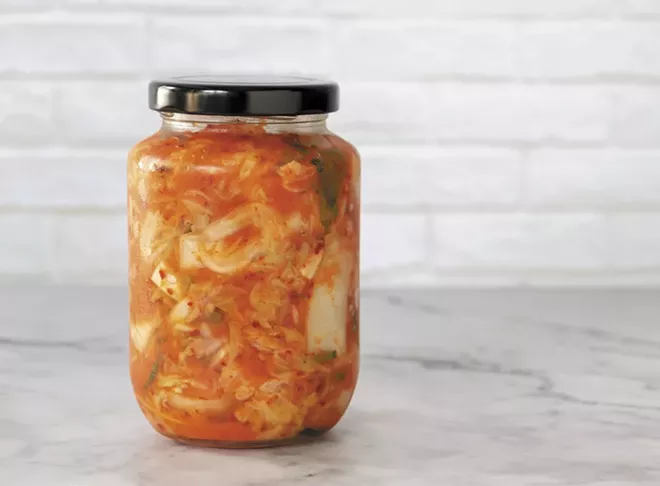From kombucha to kefir, cultured foods are famously rich in probiotics, which are great for assisting digestion and immunity. The microorganisms in your gut are also referred to as your "microbiome" — the biological ecosystem of your intestines.
Attributes
Although it might feel like cultured foods have come to fame recently, most have centuries of history backing them. Kombucha, kimchi, buttermilk, kefir, miso, sauerkraut and yogurt are all considered cultured foods, and some have histories dating back 5,000 to 10,000 years. All of these cultured foods have one thing in common — the culture of microorganisms, making them a "living food." These microorganisms can be bacteria (like in yogurt and buttermilk), yeast (like in kombucha), or a mixture of both (like in kefir). Although they're made with different processes, the microorganisms in cultured foods can boost gut health when consumed regularly.
Superpowers
The tiny microorganisms in food help our health in many ways. A healthy gut contains a wide variety of microorganisms that help us to digest complex carbohydrates. In addition to helping us break down our foods, our gut bacteria make vitamins for us that our own cells can't produce, such as B vitamins and vitamin K. Even more, the "good bacteria" of a healthy microbiome can keep "bad bacteria" at bay by outcompeting them for food sources, lowering the pH to make the environment hostile to outside microbes and even excreting certain proteins that can be antimicrobial.
Having a wide variety of bacteria in your intestines is linked with a healthier gut, better immunity and improved digestion. You can improve the diversity of the microorganisms that make up your microbiome by eating a diet of diverse plant foods and rich in fiber.
Weaknesses
Although there aren't many downsides to cultured foods, many people find trouble getting these into their diet regularly, often because they don't tolerate dairy products. Sometimes cultured products can also be expensive to add to your daily diet.
How to use it
The good news is you don't need to spend lots of money to get a diet rich in probiotics. Making your own cultured foods at home is surprisingly easy. Sauerkraut uses bacteria already existing on the leaves of cabbage to ferment, and an at-home kombucha starter can last years with proper care.
If a dairy intolerance is holding you back from enjoying a daily yogurt, explore homemade nut yogurt. Use a yogurt starter culture or open two capsules of probiotics into a homemade nut milk and let it culture in a warm place for six to eight hours. A 1:1 ratio of cashews to water in a high-speed blender gives a perfect semi-thick Greek yogurt consistency.
Stacey Aggarwal received a Ph.D. in pharmacology from the University of Washington. Now she writes about biology, health and nutrition while running a lavender farm in North Idaho.

